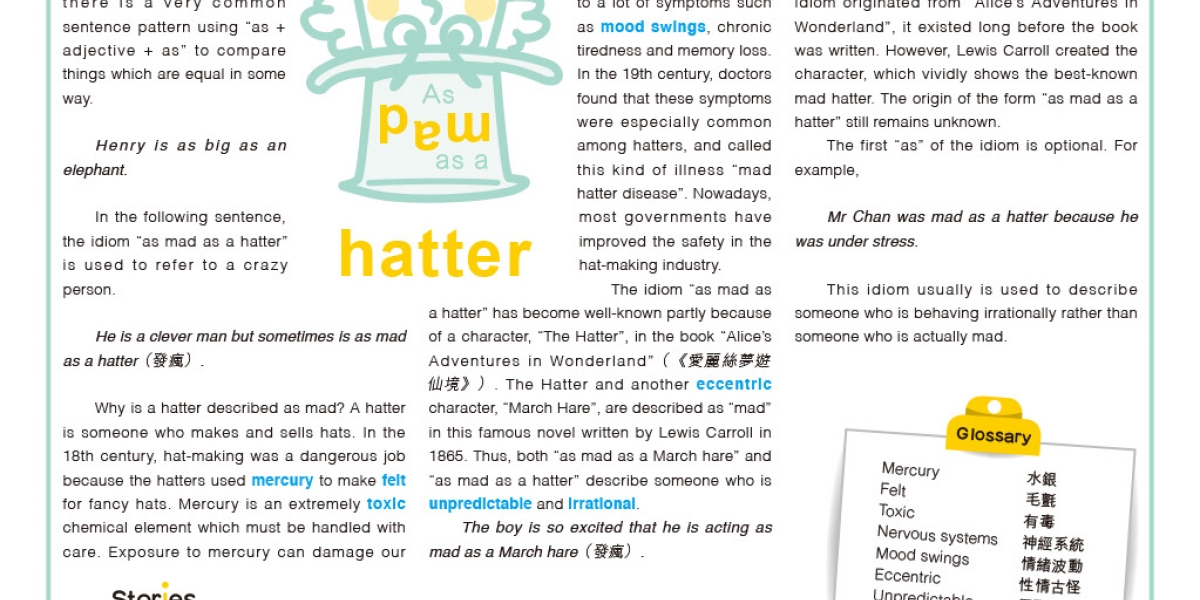昔日文章


Stories behind Idioms
2016.06.18
A chip off the old block
When people say that the son or the daughter is the same as the father or the mother, you might hear the following two proverbs:
Like father, like son. (有其父必有其子)
Like mother, like daughter. (有其母必有其女)
By looking at these two proverbs, you might easily guess that the children look like or behave like their parents. How about the idiom “a chip off the old block” in the following sentence?
Everyone says that John is a chip off the old block.
A person is described as a chip off the old block(酷似父母)if he or she is very much like one of the parents, usually the father.
A block is a piece of wood. A chip is a small piece of something which is removed in the process of cutting or chopping. When a carpenter hits a piece of wood with a hammer, a little chip falls off. In the idiom “a chip off the old block”, the father is a big piece of wood and the child is like a chip having the same characteristics as his or her father’s.
The idiom appeared as early as in 1621 in a different form, “a chip of the same block”, in a sermon given by Robert Sanderson, Bishop of Lincoln in Britain.
“Am not I a child of the same Adam ... a chip of the same block, with him?”
Later in 1642, another form, “a chip of the old block”, appeared in a book written by John Milton, a British poet.
In the late 19th century, the current form, “a chip off the old block”, appeared in the American newspaper, “The Athens Messenger”:
The child is too often a chip off the old block.
Are you a chip off the old block? In what ways are you similar to your father? Whether you bear any resemblance to your father or not, I am sure that you are still the dearest child to him.
Today is Father’s Day. So be sure you will make this day special to him.


Stories behind Idioms
2016.06.11
An olive branch
When you have a quarrel with your friend, your teacher might tell you,
“Can you think of extending an olive branch to your friend?”
Does your teacher ask you to give a branch of an olive tree to your friend? An olive branch is a symbol of peace. “Extending an olive branch” (伸出橄欖枝;願意講和)does not mean that you are giving out a real olive branch to your friend. Instead, it means that you are making an offer of peace with your friend to end the quarrel.
The olive tree has been grown in such Mediterranean(地中海)countries as Greece (希臘), Syria(敘利亞)and Egypt(埃及) since a long time ago. The fruit of the tree, the olives, is used for cooking and made into olive oil.
This idiom is biblical in origin. In the Old Testament(《舊約》), God found that the people on earth had become very bad. God was so sad that he wanted to destroy the wicked world with a great flood. Noah(諾厄)was the only one who loved God. So God wanted to save him and told him to make an ark or a big boat for his family and the animals. The rain came for forty days and nights. Noah sent a dove out to see whether the floods had stopped or not. The dove later brought an olive branch to Noah to indicate that the floods had gone and God was not angry anymore.
While this idiom came from the story of Noah, olive branches were also used as symbols of peace in the customs of Ancient Greece before the biblical time. This symbolism continues in works of art in Western culture such as murals and paintings. The Great Seal of the United States(美國國璽), which is used to authenticate official documents, also shows an olive branch. On one side of the seal, an eagle holds an olive branch in its right talon and its head turns toward the olive branch. This symbolises that the United States has a strong preference for peace.
Since many countries in the world are still at war, let us hope that they will offer each other an olive branch to stop the war(化干戈為玉帛).


Stories behind Idioms
2016.06.04
As mad as a hatter
In the English language, there is a very common sentence pattern using “as + adjective + as” to compare things which are equal in some way.
Henry is as big as an elephant.
In the following sentence, the idiom “as mad as a hatter” is used to refer to a crazy person.
He is a clever man but sometimes is as mad as a hatter(發瘋).
Why is a hatter described as mad? A hatter is someone who makes and sells hats. In the 18th century, hat-making was a dangerous job because the hatters used mercury to make felt for fancy hats. Mercury is an extremely toxic chemical element which must be handled with care. Exposure to mercury can damage our nervous systems, leading to a lot of symptoms such as mood swings, chronic tiredness and memory loss. In the 19th century, doctors found that these symptoms were especially common among hatters, and called this kind of illness “mad hatter disease”. Nowadays, most governments have improved the safety in the hat-making industry.
The idiom “as mad as a hatter” has become well-known partly because of a character, “The Hatter”, in the book “Alice’s Adventures in Wonderland”(《愛麗絲夢遊仙境》). The Hatter and another eccentric character, “March Hare”, are described as “mad” in this famous novel written by Lewis Carroll in 1865. Thus, both “as mad as a March hare” and “as mad as a hatter” describe someone who is unpredictable and irrational.
The boy is so excited that he is acting as mad as a March hare(發瘋).
While a lot of people think that the idiom originated from “Alice’s Adventures in Wonderland”, it existed long before the book was written. However, Lewis Carroll created the character, which vividly shows the best-known mad hatter. The origin of the form “as mad as a hatter” still remains unknown.
The first “as” of the idiom is optional. For example,
Mr Chan was mad as a hatter because he was under stress.
This idiom usually is used to describe someone who is behaving irrationally rather than someone who is actually mad.


Stories behind Idioms
2016.05.28
High-flyer
Before aeroplanes were invented, people dreamed of being able to fly like birds. Many brave inventors thought of different ways to fly high in the sky. However, many experiments failed until the Wright brothers invented the world’s first successful aeroplane in the 19th century.
We can say a thing like an aeroplane which flies high in the air is a “high-flyer”.
The engineers were pleased that they had successfully designed an aeroplane to be a powerful high-flyer(高空飛行器).
On the other hand, “high-flyer” can be used as an idiom. A high-flyer is a person who has a lot of ability to be very successful in his or her career.
Jack is a young high-flyer(有抱負的人)in information technology industry.
The origin of the idiom is related to a Greek(希臘)myth. A wicked king asked an architect to build a maze to keep his terrible monster in. Later, the king’s enemy invaded the maze, killed the monster and took away the king’s daughter. The king was very angry and imprisoned the architect and his son Icarus in the maze he had designed, which was on an island surrounded by water. The clever architect made two pairs of wings for himself and Icarus. He stuck feathers onto a wooden frame with wax. Before they escaped, the architect told Icarus not to fly too near the sun because the heat would melt the wax.
Icarus got too excited and forgot his father’s warning. He flew higher and higher in the sky. Can you imagine what happened next? The heat of the sun melted the wax and the feathers dropped to the sea. When Icarus realised the danger, it was too late. He fell into the sea and died.
The idiom “high-flyer”(好高騖遠)was first used with a negative meaning in the 16th century to describe someone who aimed too high beyond their talents.
In the English language, “high-flyer” and “high-flier” are interchangeable, though the former is more common. We may also change this idiom into an adjective “high-flying” to describe a person who is successful in his or her career.
She has a high-flying(有抱負的)businessman husband.






